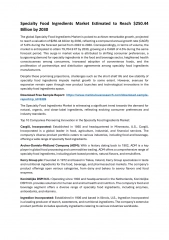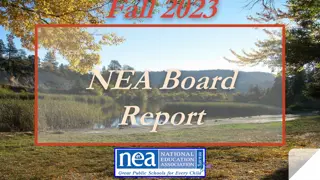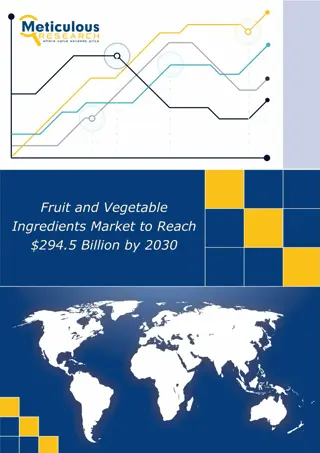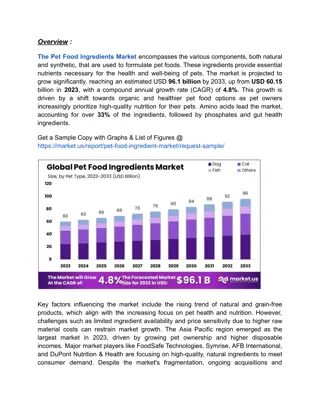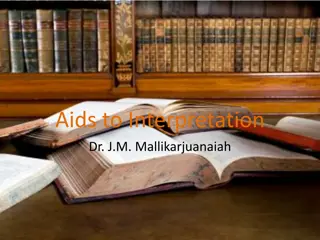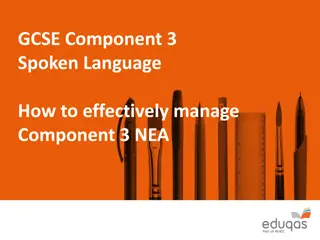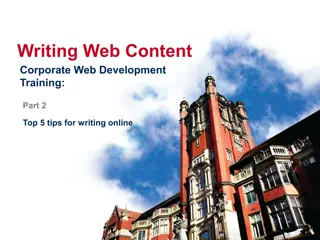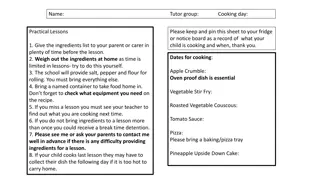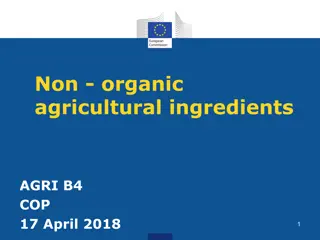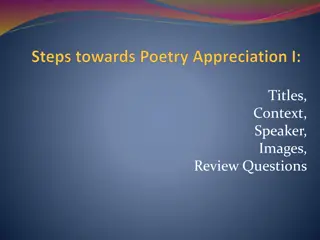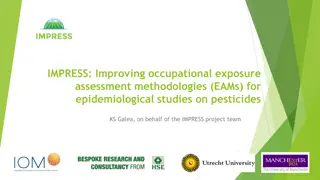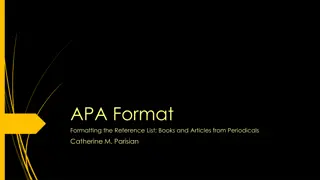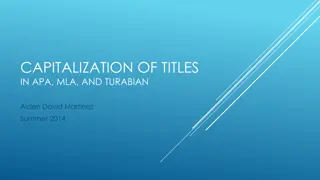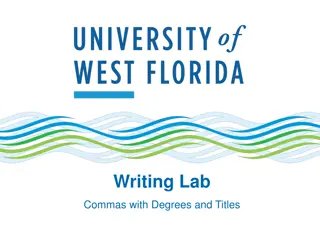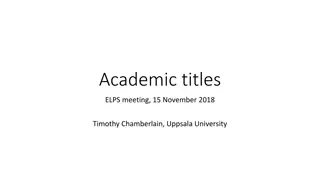Enhancing Success in Writing NEA Titles: Key Ingredients and Methodologies
Understanding the potential issues with student titles and identifying the key ingredients for successful outcomes in writing NEA titles is crucial. The recipe for success lies in clear project scope, strong core concepts, well-planned methodologies, and effective data collection. Avoiding common pitfalls, such as unclear goals and haphazard research methods, is essential for achieving successful titles.
Download Presentation

Please find below an Image/Link to download the presentation.
The content on the website is provided AS IS for your information and personal use only. It may not be sold, licensed, or shared on other websites without obtaining consent from the author.If you encounter any issues during the download, it is possible that the publisher has removed the file from their server.
You are allowed to download the files provided on this website for personal or commercial use, subject to the condition that they are used lawfully. All files are the property of their respective owners.
The content on the website is provided AS IS for your information and personal use only. It may not be sold, licensed, or shared on other websites without obtaining consent from the author.
E N D
Presentation Transcript
A recipe for success: writing NEA titles Section 1: What are potential issues with student titles? Section 2: What are the key ingredients for successful outcomes? Section 3: Methods to get to successful titles
Why does this matter? [Some] developed a series of sub-hypotheses or sub- questions that were not closely connected, so their investigations tended to become fragmented and lacking in continuity. .candidates must develop their own titles that is the central function of the form. [in a minority of cases].. This was most evident when titles varied only by a word here and an emphasis there. Titles that attempt to prove the impossible e.g. how successful a recent renovation project has been. Without a precise focus and clear parameters 3 to measure 'success', studies such as this will provide few opportunities for drawing valid conclusions. AQA examiners report 2018 3 Edexcel examiners report 2018 2 Update from awarding bodies 2018 1 1 Joint report on NEA all award bodies https://www.ocr.org.uk/Images/521840-independent-investigation-outcomes- autumn-2018.pdf 2 https://qualifications.pearson.com/content/dam/pdf/A-Level/Geography/2016/Exam- materials/9GE0_04_pef_20180815.pdf p4 (Edexcel) 3 https://filestore.aqa.org.uk/sample-papers-and-mark-schemes/2018/june/AQA-70373-WRE-JUN18.PDF p4. (AQA)
Background: Y13 Survey Which was the most difficult part of the NEA? 2017-18 35% 26% 2018-19 In 2017 cohort 140 students In 2018 cohort 160 students
1.1 What happens when the recipe goes well? Core Ingredient ingredients included Geography Specification Student is clear on project scope and goals Stronger outcomes Core concept, geographical idea or theory Aim Sub questions Scale Student plans method and undertakes primary data collection Project stays manageable length and scope Primary data Higher level thinking
1.2 What happens when the recipe goes bad? Core Ingredient ingredients missing Geography Specification Investigation is very difficult for student weaker outcomes Core concept, geographical idea or theory Aim Sub questions Scale Student falters to understand how to plan method or do research Project becomes haphazard or gigantic Primary data Higher level thinking
1.3 Poll 1 Please type in Poll 1 1 most successful in your view? 2 What things can go wrong with some student titles? What types of titles are Type 1 and 2 in front of your responses
1.4 What ingredients will affect outcomes adversely? Project questions which generate descriptive projects which lack any analytical elements Project titles which are truisms seeking to demonstrate well-known facts Titles which compare two places but collect a very large volume of data without geographical justification
1.5 What ingredients will affect outcomes adversely? A question that looks into the future e.g. sea level rise, impact of a development, success of a regeneration project (that is not fully completed). These are technically impossible to measure. A question which relies on a data collection technique rather than a rationale for the investigation A title which is at a large geographical scale and so is not answerable The title holds no interest for the student or the teacher
2.0 Question analysis Poll 2 A comparison of the extent to which soil, water and plant growth vary by season and location In Sherwood Forest 1 To what extent do high street and retail changes along High Street, Hitchin affect people s perception of the area between 2010-2017? 2 3 To what extent does inequality vary between two adjacent wards in Tower Hamlets? How and why does the quality of life differ between the Diagonal Mar and La Mina districts of Barcelona? 4 Tick the NEA title proposals in the poll that you think have the potential to be most successful To what extent is longshore drift the dominant process affecting the coastline on Chesil beach? 5 To what extent is the Guided busway in Cambridge a cost effective solution to congestion? 6 Please raise questions in the Q&A box if questions occur to you doing this. 7 To what extent are place perceptions affected by distance from the Leeds city centre? 8 To what extent has the redevelopment of Cambridge been successful? 9 How does discharge and velocity with distance downstream in the River Lemon?
2.1 What makes successful NEA question? Specification Higher level thinking Real geography Ingredients for successful questions Clear understanding of primary data and its purpose Theory, model or process Clear spatial context
2.2 What are the core ingredients? Clarity of overall question and sub- questions supports successful outcomes
Area of interest Reading Concept or idea/process Identifying a series of questions to select from How/What/Where/ to what extent/how far? Set overall aim linked to sub-questions Aim Concept/process/theory Sub- questions
3.1 Teaching and learning to get to successful titles Before the NEA starts: Skill Development: Geographical enquiry questions Skills development: using sources Skill development: using images When preparing students for NEA: Skill development: using possible titles Using diagnostic sheet Being explicit about assessment criteria and importance of titles
Poll 3 Poll 3 Which of the following do you currently use to help students get to their title, either before or during the NEA? (Tick as many as apply) 1. Using the OCR student guide to the NEA 2. Analysis of titles 3. Sharing with students information on Geographical Enquiry process 4. Developing use secondary sources to generate questions 5. Using images to generate questions 6. Using a checklist or diagnosis process to help students to refine title 7. Being explicit about assessment criteria and importance of titles for whole NEA Use Q&A box for questions please
3.2 Geographical Inquiry for NEA Investigating a geographical concept Investigating similarity and difference Investigating a conflict, geographical issue Geography is described as a spatial science because it focuses on "where" things are and why they occur there.1 Geographical Investigations for NEA Investigating change over time Investigating a geographical process 1https://www.earthonlinemedia.com/eboo ks/tpe_3e/essentials/geography_as_a_spat ial_science.html1
3.3 Skill development : using sources to identify geographical enquiry questions However, many did not demonstrate the appropriate links between such theories and their own questions/hypotheses for study. The literature review was too frequently delivered as a standalone component rather than embedded within the introductory section. This can then be the substance behind the ideas to subsequently be tested and which could then be applied within both the analysis and concluding sections 1 1 https://www.ocr.org.uk/Images/538028-examiners-report-non-examined- assessment.pdf
3.4 Using Images Manchester (A43 Upper Brook Street) Using an images to encourage investigative thinking 1) What geographical concepts are visible? 2) What geographical concepts could be investigated? 3) How would you find out more about this area now?
3.2 Skill Development using possible questions See documents and discussion points following
3.3 Skill Development using diagnostic sheet
3.4 Skill Development: Being explicit about assessment criteria and importance of titles You don t realise when you come up with a title how crucial that is ... How it s going to affect your whole project Student in lockdown, 2020
Additional resources Guide to developing titles and proposals https://www.ocr.org.uk/Images/396138-a- level-geography-independent-investigation-guide-to-developing-titles-and- completing-the-proposal-form.pdf OCR 2019 Exemplars https://www.ocr.org.uk/qualifications/as-and-a- level/geography-h081-h481-from-2016/assessment/ Student Guide to writing the NEA https://www.ocr.org.uk/Images/390518- independent-investigation-student-guide.pdf https://www.ocr.org.uk/Images/386110-a-level-geography-geographical- investigations-field-studies-council-2016-.pdf FSC leaflet overview FAQs on NEA questions answered https://www.ocr.org.uk/Images/386111-a-level- geography-independent-investigation-faq-s.pdf FSC NEA planning starting point https://www.geography-fieldwork.org/a- level/before-starting/planning/aims-and-hypotheses/ RGS student guide https://www.rgs.org/CMSPages/GetFile.aspx?nodeguid=882a6e79-5e28-4667-a753- 17d26cec8c19&lang=en-GB GA upcoming webinars on NEA https://www.geography.org.uk/events/preparing-for- your-nea/8396?OccId=12179 A level Geography Independent Investigation, Andy Owen (2019) https://insightandperspective.co.uk/publications/a-level-geography-independent- investigation-a-practical-guide



